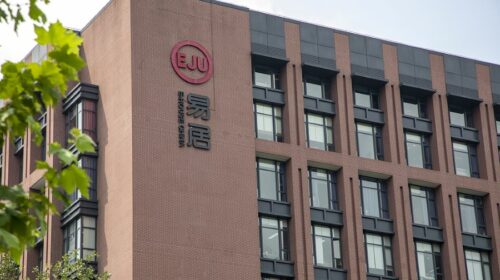Conservative E-House Spruces Up With Modest Acquisition

Purchase of real estate data and services provider Tianji for $46 million is in line with approach that has kept company profitable through turbulent times
Key Takeaways:
- E-House’s latest modest acquisition is in line with its longer-term conservative approach in China’s real estate services market
- That approach could protect the company from market volatility, but could also lead to its irrelevance as it gets overtaken by more aggressive peers
By Doug Young
China’s property market has boomed over the last two decades on the back of the country’s huge economic growth story. But you might never know that by looking at real estate services specialist E-House (China) Enterprise Holdings Ltd. (2048.HK), an early market leader that has just announced a modest new acquisition that feels like the result of some bargain hunting.
Perhaps that’s the problem with this company, whose early close ties with Chinese internet pioneer Sina made it look like a solid bet to become a leader in the country’s young and fast-growing real estate market. While other companies are thinking big, E-House always seems more focused on the little details.
That kind of focus comes through in the company’s latest announcement made Tuesday after markets closed, involving the purchase of a small company called Tianji Networks, which provides data analytics for the real estate sector. E-House said it will pay a relatively modest 300 million yuan ($46 million) for Tianji, whose data and services “would complement and support (E-House’s) online real estate segment,” according to the announcement.
Tianji certainly won’t bring major new revenue or profits to E-House, at least not directly. Its revenue fell by nearly half last year to 35.6 million yuan, and its net loss grew to 67 million yuan from a 46 million yuan loss a year earlier, the announcement said. Those amounts are a tiny fraction of the figures for E-House, whose own revenue fell 11% last year to 8.1 billion yuan, while its profit dropped by nearly two-thirds to 315 million yuan.
Still, investors seemed to welcome the small piece of good news from E-House, with the company’s shares up 3% in morning trade the day after the announcement.
The small nature of the acquisition seems to reflect E-House’s inability to think big, which has perhaps helped to keep the company stable but has also kept it from realizing greater potential. The firm is one of the few in China’s real estate sector that has managed to stay profitable over the last two years, even as the pandemic and government tightening measures dampened the market for a large portion of that time.
E-House even recently declared a very modest annual dividend that amounted to a payout rate of about 0.7%. While that’s nothing to sneeze at, considering most Chinese real estate companies aren’t giving any dividends these days, it’s also unlikely to entice investors into buying the company’s shares.
In some ways, E-House seems like a real estate version of its early major investor Sina, which was one of the first major players on China’s internet scene. Sina operated a web portal whose name was synonymous with independent news in the first part of the 21st century, and was one of the first Chinese companies to list in New York.
But Sina has largely languished into irrelevance over the last decade as it got overtaken by more-aggressive peers and is now in the process of trying to privatize and delist.
Moving House
E-House made a similar move in 2016, delisting from the New York Stock Exchange amid a broader similar movement by Chinese companies. Most of those companies felt that New York investors didn’t appreciate or understand their stories, and wanted to re-list closer to home either on one of the Chinese mainland’s two main markets or in adjacent Hong Kong.
E-House succeeded in re-listing in Hong Kong in July 2018, or roughly two years after leaving New York. It briefly achieved the higher valuation it was looking for by selling shares in a Hong Kong IPO that valued the company at roughly $3.4 billion. That was nearly three times its $1.2 billion valuation at the time of its New York privatization.
But the stock has lost around half of its value since the Hong Kong IPO, as impatient investors watched the company getting passed by more-aggressive and nimble peers. Most notable among those is KE Holdings, the New York-listed owner of the Lianjia chain that is a leading provider of real estate services in China.
KE’s stock has nearly tripled from its IPO price less than a year ago, as the company swung from a large loss in 2019 to a 2020 profit of 2.8 billion yuan on the back of 50% revenue growth for the year. That clearly got investors more excited than E-House’s modest revenue decline last year, even as the company managed to stay profitable in the face of difficult conditions.
From a valuation perspective, E-House’s price-to-earnings (PE) ratio currently stands at a fairly high 28, though the figure would drop to just 10 based on its stronger 2019 profit. By comparison, KE Holdings trades at a lofty PE of 100 based on 2020 earnings, though the figure drops to a lower, but still relatively high, 56 based on analyst forecasts for its profit this year.
In terms of global comparisons, E-House’s current valuation is roughly comparable with that of U.S. peer Newmark Group, a nearly 100-year-old company whose current ratio stands at 27.
All that said, it’s hard to get too excited about a company like E-House due to its relatively conservative approach. E-House could represent a good bet for those looking for something stable in China’s ever-changing real estate landscape. But then again, as the case with Sina shows, such conservative companies also have a way of becoming irrelevant in China’s fast-moving economy, where they can be overtaken by more aggressive up-and-comers like KE Holdings.
To subscribe to Bamboo Works weekly newsletter, click here





